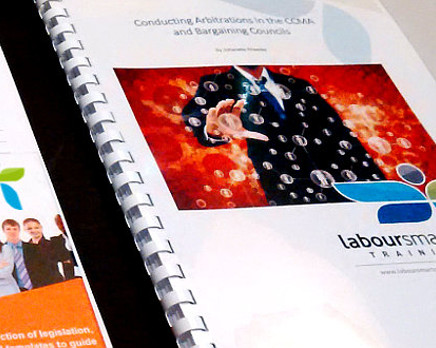- Course Name
- DL15 - Organisational rights & Collective bargaining
- Course Description
This practical training provides the delegates with a complete insight into the legal requirements of the LRA with regard to collective labour law and labour relations. The course provides a unique insight into managing and building the relationship between employee, union and the employer. The ideal delegate would be managers, shop stewards, union officials, office bearers and IR managers.
- Duration
- 1 module
- Cost
- R950.00
Module 1 : DL15 - Organisational rights & Collective bargaining
This course provides the delegates with a complete insight into the legal requirements of the LRA with regard to collective bargaining and labour relations. The course provides a unique insight into managing and building the relationship between employee, union and the employer.
This three hour session aims to simplify the Act to make it practically applicable to your business and suggest practical methods of compliance.
Module 1 Session 1: Introduction
- Progression of rights under the Constitution
- The Labour Relations Act, framework and fundamental rights
- Freedom of association – what does it mean in the collective world.
- Protection of freedom of association in terms of the LRA – section 4 to 8
- What is a Trade union?
- Who are the role players in a Trade union?
- What does sufficient representativity mean under the LRA?
- Majoritarianism and plurality
- What rights does a Trade Union have when it is sufficiently represented
- The difference between rights and interest in the union world.
- Rights in terms of section 11 to 16.
- The rights of the majority union under the LRA
- Conclusion and questions
Module 1 Session 2: Excercising of collective rights
- Exercising of rights – section 18 – setting thresholds
- Procedure to seek recognition – section 21.
- Extension of rights – Sec 18A to the most representative union
- Procedure to withdraw organisational rights
- Collective agreements – binding status and extension to non-unionized members
- Notice to cancel a collective agreement
- The difference between collective and recognition agreements
- The right to bargain v a duty to bargain – power play in the workplace.
- Mechanisms of collective bargaining
- Interest and rights disputes
- Difference between negotiations and consultation procedures
- Negotiation behaviour and successes
- Agency shops and closed shops
- Union liability – damages and member conduct
- Conclusion and questions
Module 1 Session 3: Conflict resolution
- The change in behaviour and unionism in the last 10 years
- Main sources of conflict – some common problems in the workplace
- Organisational conflict – the effect on employees and relationships
- Change management and down-sizing in COVID 19 pandemic
- The role of values and leadership on collective behaviour and relationships
- Resolving conflict – changing perceptions about and assumptions about conflict in the workplace
- Resolving conflict – changing conflict to a positive outcome
- Positive and negative conflict in the unionized environment
- How to prevent negative conflict -strikes and violence
- Some easy conflict management techniques
- Maintaining relationships with unions
- Conclusion and questions
2025 © LabourSmart Training (Pty) Ltd. All Rights Reserved. | Developed and Hosted by Resolve Technology Solutions (Pty) Ltd | SEO by NextG



